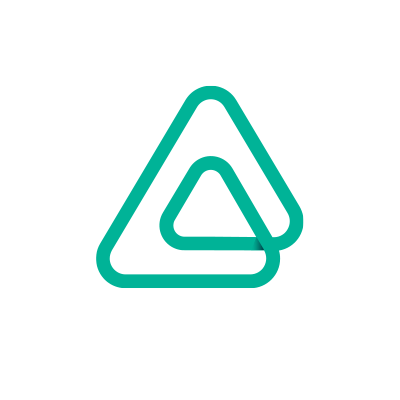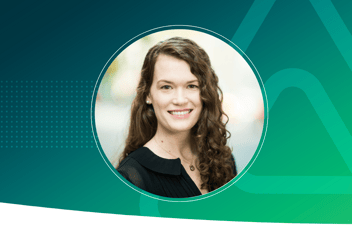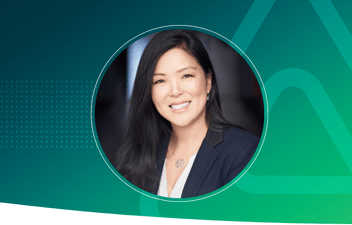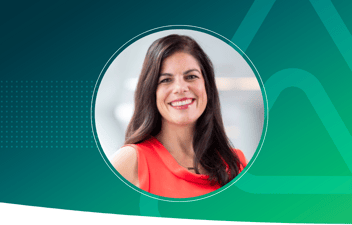Throughout her journey in human resources, Kelly Scheib has seen the field evolve from fighting for a seat at the table to being at the forefront of today’s most important initiatives.
Now, much of the emphasis is on diversity, equity, inclusion, and how employers “show up for the people who actually do the work,” Scheib said. As someone who chose human resources, AKA the “people team,” from the very start of her career, Scheib has worked across a range of HR capacities at companies like Hubbell Lighting and Proterra.
But after more than 15 years in the field, Scheib said she realized it was time to “round out” her career and make some changes. Through AboveBoard’s platform, Scheib secured a new fully remote job and successfully switched industries.
As the first-ever Chief People Officer at Crunchbase, a prospecting platform powered by best-in-class proprietary data, Scheib is using her expertise to set the platform’s vision and strategy as it relates to its workforce.
Ahead, we chat with Scheib about the evolution of the HR industry, how she adjusted her career trajectory, and her perspective on diversity, equity, inclusion, and belonging efforts. (Hint: It’s not what you think.)
Tell us about your career so far. What got you to where you are today?
I'm one of the few people in the world who chose human resources, or the people function, as a profession early on in college. Most find their way into human resources from different business roles. I did not. I chose it and have had a variety of different roles in the people space since 2006.
I've been super fortunate to have taken on roles of increasing responsibility within specialty spaces. So, while I would consider myself a human resources generalist at heart, I have had the opportunity to work in and lead specialty functions.
2020 was a chaotic year for everyone. There was such an emphasis on diversity, equity, and inclusion as well as how people related to their organization and how organizations supported folks. How did those transitions impact the way you showed up as an HR leader?
When I started my career, it was a very tactical space, really fighting for a seat at the table. COVID-19 turned that on its head. All of a sudden, there was a laser focus on the people team. It was like, “We need this team to help us navigate this crazy land we were living in." It was an interesting shift in how we were viewed. What'll be really interesting, though, is as the pandemic wanes, whether the people team will move back into this fight for executive presence or whether it will stay at the forefront of many organizations.
The DEI space has exploded, but it's certainly not new. There's been a considerable amount of intentionality behind how employers show up in the diversity, equity, inclusion, and belonging (DEIB) space in general. I'm probably unique in my perspective about how it shows up in an organization because I don't believe in isolated functions regarding DEIB.
I'm far more inclined to say DEIB needs to be so well ingrained in your organization that you don't need dedicated folks leading the charge. It should be something that is led in everything we do…Looking at everything through the lens of DEI really shapes the culture of an organization.
Not to say some organizations don't need dedicated focus, especially in the beginning. But the process should evolve into not needing dedicated focus because it’s ingrained in everything you do.
I wonder, as the workforce evolves and new people enter in with a different view on organizational accountability, if HR will continue to be that important.
Every generation was brought up differently and it certainly influenced the way they show up at work. I’m a millennial. There were lots of opinions about millennials and how we were going to show up. Now, we make up a considerable percentage of the workforce. We’ve lived through times that shaped us. The Great Recession happened during my first couple years at work, and I returned early from my first maternity leave to lay people off. If that doesn’t shape you as a new mama, as a new employee, as someone who’s reasonably inexperienced without a savings account, I don’t know what does.
I think the newer generation entering the workforce is being shaped differently in a pretty awesome way, that is authentic, real, and no nonsense. One of the things that’s really interesting is how they’re forcing the employers of the world to really think about how companies show up for people.
While I imagine there will always be pendulums swinging with the employee/employer power dynamic, I think the new generation forces the hands of more traditional employers to think more holistically and intentionally about how they show up for the people who actually do the work.
And nothing is more indicative of that than the power struggle between managers and employees regarding fully remote, hybrid, and in-person work. Ten years from now, it’ll be interesting to see how 2020 and 2021 shifted work … whether we’re hybrid or fully remote. Crunchbase is fully remote, which is actually one of the reasons I joined.
So, what ultimately led you to making a transition in your career?
Prior to Crunchbase, I was VP of Human Resources at Proterra, a manufacturer and an EV tech company. At the time, electric vehicles, the concept of clean energy, and clean tech was exploding. It was a super fun time to be in the space. But I understood that in order to round out my career, I needed to make some changes to the way my profile looked. I also knew that in order to maintain growth in my role, I wasn't going to find it in Greenville. So, it was really an opportunity for me to make a change, pursue a different industry, and round out my profile.
Another thing about me is I've learned a lot about where I like to play. I'm not a big company girl. As the head of HR, you lead from the bunker. You call the shots. But someone else is running them. That's not me.
I'm more of a leader who wants to be in it. I want to be equal parts alongside people and setting the strategy. Crunchbase affords me that opportunity. While I don't have to be tactical, it does afford me the opportunity to still be close to the employees I am supposed to be serving.
What was your experience on AboveBoard’s platform like?
I found my job at Crunchbase because of AboveBoard, and that was wonderful. The simplicity of AboveBoard was remarkable. The ability to just say, "Hey, I'm interested," and clicking a button was really wonderful and super easy.
When it came time for me to dip my toe in, I was like, "Oh, I'm super interested in some of these types of roles," specifically highlighting remote-first because I live in Greenville, South Carolina, a place without a wide abundance of in-person CPO roles. I likely would have had to move to San Francisco or New York, which I just didn't want to do with my family situation. AboveBoard let me explore opportunities that allowed me to stay be here and work from here.
What else drew you to the opportunity at Crunchbase?
While I would say I was actively in the job market, I was listening more than anything else. I was happy; I wasn't desperate to leave. When the recruiter called me about Crunchbase the first time, I was like, "Oh, I'm not really sure." Then he explained who the CEO is. Jager McConnell, he's just much more progressive minded. And at Crunchbase … they’re just real.
One of the things I loved about interviewing with the executive team and board at Crunchbase was they came off as authentic humans versus what you see sometimes in more professional interviews. And it wasn't that they weren't professional—the interview process is structured and professional. They were just transparent, open, and honest. They knew what they were looking for. It was more about cultural fit with the team than it was about whether or not I had closed 40 acquisitions.









